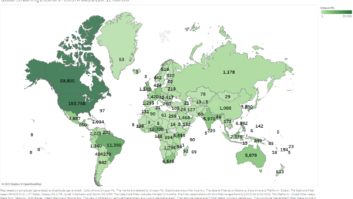Greater Media CEO Peter Smyth suggests the music industry and its licensing organizations should make it easier for radio stations to stream that music by untangling data reporting requirements. Because if something doesn’t change, some radio stations may need to stop streaming, he cautions in his latest blog.
Smyth says current streaming data reporting requirements are “arcane and demanding,” that stations must calculate “how many thousands of dollars we owe for the privilege of breaking even on our streams.”
The digital rights organization SoundExchange, which collects and distributes streaming royalties, has made several suggestions to the Copyright Royalty Board, which is preparing to make changes to rules that dictate what radio stations pay for streaming their stations, according to Smyth. Those would include more specifics about each song streamed, less time to file reports, the imposition of late fees and the mandatory use of a unique code identifying a particular sound recording, according to the CEO.
We’ve reported that SoundExchange recently joined with other groups in the music industry to support an effort to make Pandora and SiriusXM pay royalties on songs recorded before 1972, so they’d be covered under copyright law. This effort, combined with potential upcoming changes to streaming royalty reporting requirements, creates more friction between music creators and those who popularize contemporary music, according to Smyth, who adds that the music industry “fails to appreciate” that both broadcast and online radio, too, are facing monetary and technological challenges.
“We have seen the migration of listening to online devices, and have borne the financial burdens of increasing royalty payments and broadband usage because we know we need to be wherever our listeners want us to be,” says Smyth. “We have seen the emergence of newer competitors providing more personalized playlists than a radio broadcast; we have seen the usage patterns for services such as Pandora and satellite radio continue to disrupt habits and fragment listenership. But all SoundExchange seems to see are new sources of revenues.”
Radio believes in innovation as well as its ongoing relationship with listeners, according to the broadcast executive. “Despite all the new technology, broadcast radio still is, far and away, the primary source for new music discovery for the vast majority of the public.”
So the radio industry continues to search for “reasonable agreements with music creators and labels to rationalize our partnerships and take the longer view that both sides need to find the win/win solution,” according to Smyth, who says that regard needs to go both ways. “How about respecting those of us who have popularized and continue to expose the back catalog of artists and have contributed to the longevity and success of their careers?”
He equates placing radio’s fate “in the hands of a government agency whose primary contribution to date has been imposing ever more burdensome requirements” as the “worst of all possible outcomes. It diverts precious resources from our primary business — entertaining our listeners with great music — to the drudgery of paperwork and raises the very real possibility that we will no longer be able to justify the expense, in dollars and person-hours, of streaming.”
Smyth characterizes the past 11 years of warring words as “frustrating and counterproductive for all concerned.”












